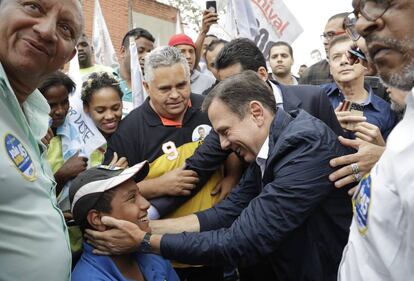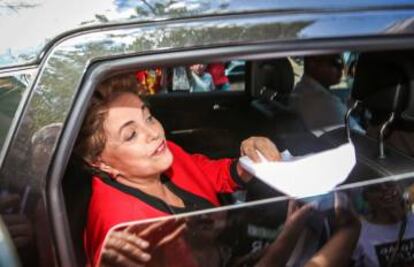Brazilians punish traditional politicians at local elections
Workers’ Party dealt a crushing defeat in wake of Petrobras scandal and Rousseff impeachment

Brazilians voted in more than 5,000 mayors on Sunday, in an election marked by the ongoing political crisis and the tension resulting from recent street violence.
The strain is such that President Michel Temer, who was sworn in on August 31 after Dilma Rousseff’s impeachment, showed up at the polling station in São Paulo three hours ahead of the time he had announced, in order to avoid a planned student protest against him.
Public safety has deteriorated and that is reflected in the election process
Gilmar Mendes, head of Superior Electoral Court
Yet despite his low popularity ratings (only 14% of Brazilians approve of his being the president), the outcome of the Sunday elections has provided support for Temer – if only in an indirect way.
Temer, of the Brazilian Democratic Movement Party (PMDB), can only benefit from the humiliating defeat sustained by the Workers’ Party (PT), which was once the largest left-wing force in all of South America but is now fighting for survival in the wake of the Petrobras corruption scandal.
The PT debacle in São Paulo must have tasted especially sweet to Temer: the city awarded a crushing victory to the Brazilian Social Democrat Party (PSDB), headed by João Doria Jr., a conservative businessman whose campaign was based on resentment against traditional politics and against the left in particular.

Doria, who supported Temer during the Rousseff impeachment process, will not have to go to a runoff. But his victory in the biggest city in South America is no more relevant than the fact that the outgoing mayor, Fernando Haddad of the PT, was able to muster no more than 16.43% of the vote.
In Rio de Janeiro, analysts were surprised at the strong performance by Marcelo Freixo, the candidate for a tiny group called Socialism and Freedom Party (PSOL), which is ideologically to the far left of the PT. Freixo will face off with the conservative bishop Marcelo Crivella, of the Republican Party (PRB), in the upcoming runoff vote.
Although the outcome of the Sunday vote is influenced by local politics, these municipal elections are also being viewed as the unofficial start of the 2018 presidential race. Analysts say they could be used as a measure of popular reaction to Brazil’s deeply discredited politicians at a time of profound economic recession. In the wake of the Petrobras scandal, this is the first time in recent Brazilian history that candidates were barred from accepting corporate campaign donations.
Violence during campaigning
“After the Sunday vote, the political class could react in two ways,” writes the US consultancy Eurasia in a recent report. “The most likely reaction is to try to pass legislation restoring corporate donations and thus restoring the status quo. The second, less likely one, is for them to try to reform the rules to make campaigns less expensive.”
The campaign was marred by violence. In the Rio de Janeiro metropolitan area, police are still investigating a wave of deaths of candidates and political leaders. As the race came to an end, a candidate to the mayor’s office in Itumbiara, in Goiás state, was shot to death in a gun attack that also left the deputy governor wounded.
These municipal elections are also being viewed as the unofficial start of the 2018 presidential race
In order to ensure a peaceful vote, 25,400 army troops were deployed to 498 municipalities in 16 states. In Río de Janeiro, 6,500 soldiers were in charge of guaranteeing public safety.
“Public safety has deteriorated and that is reflected in the election process,” said Gilmar Mendes, the head of the Superior Electoral Court, which is the top election authority. “We have more violence now than we did in 2012.”
English version by Susana Urra.
Tu suscripción se está usando en otro dispositivo
¿Quieres añadir otro usuario a tu suscripción?
Si continúas leyendo en este dispositivo, no se podrá leer en el otro.
FlechaTu suscripción se está usando en otro dispositivo y solo puedes acceder a EL PAÍS desde un dispositivo a la vez.
Si quieres compartir tu cuenta, cambia tu suscripción a la modalidad Premium, así podrás añadir otro usuario. Cada uno accederá con su propia cuenta de email, lo que os permitirá personalizar vuestra experiencia en EL PAÍS.
¿Tienes una suscripción de empresa? Accede aquí para contratar más cuentas.
En el caso de no saber quién está usando tu cuenta, te recomendamos cambiar tu contraseña aquí.
Si decides continuar compartiendo tu cuenta, este mensaje se mostrará en tu dispositivo y en el de la otra persona que está usando tu cuenta de forma indefinida, afectando a tu experiencia de lectura. Puedes consultar aquí los términos y condiciones de la suscripción digital.








































